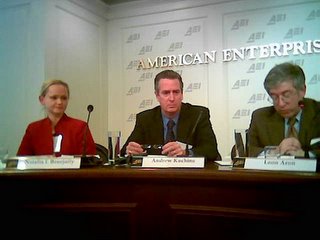Yesterday,
Leon Aron moderated an all-star panel at the American Enterprise Institute on the implications of Russia's new NGO law. No one actually defended the law. Ntalia Bourjaily and Andrew Kuchins (below) detailed problems the new law posed for American-supported NGOs working in the former USSR.

On the other hand, Nikolas Gvosdev (below) said the letter of the law was not as significant as how the Russian government would interpret the law, and that NGO concerns were not pressing at this time for a rising Russian middle-class just beginning to enjoy personal freedoms of travel, consumption, and lifestyle. He predicted that many non-political NGOs would not be affected, so that the impact of the law would be mostly felt by political activists, and attention must be paid to how they are affected. Maureen Greenwood (below) presented dramatic examples of NGOs targeted by the Russian government today.

Unfortunately for Amnesty International, Greenwood's chosen example of a victim of the Russian NGO crackdown seems to be the
case of the Russian-Chechen Friendship Society, now hbeing arrassed for publishing articles by the late Chechen terrorist leader Aslan Maskhadov in its magazine. Although Greenwood described his articles as "non-violent," Maskhadov is to Russia what Osama Bin Laden is to the USA. It is doubtful that an "American-Al Qaeda Friendship Society" would be permitted to operate in the context of the War on Terror (any more than the German-American Bund was permitted to operate during World War II). If Amnesty International, once known for a commitment to non-violent prisoners of conscience, has now decided to champion violent Islamist terrorists like Maskhadov, one would have to question why anyone in America--let alone Russia--would want to to support its efforts. And led this observer to question why Maureen Greenwood, who edited the 250-page report
Anti-Semitism in the Former Soviet Union, 1995-1997, didn't discuss the existence of anti-Semitism and anti-Zionism among Islamist Chechens--examples such as
this 2002 report by Lev Gorodetsky of the Jewish Telegraphic Agency:
A leaflet distributed recently in Chechnya stoked Jewish concern with the comment: "The Chechen people are continuing their great jihad by clearing the fatherland from Russian occupiers, servants of the world's Jews."
You can watch a video of the event,
here.

